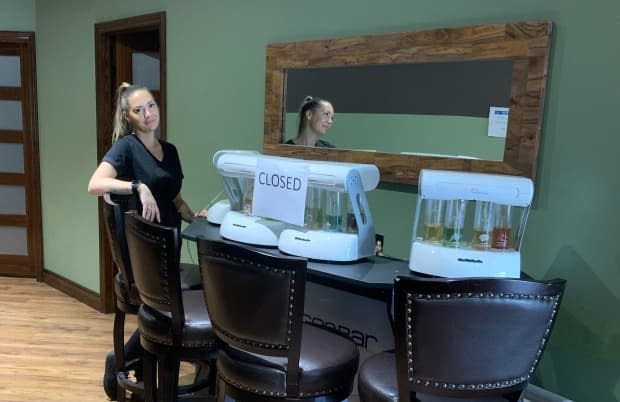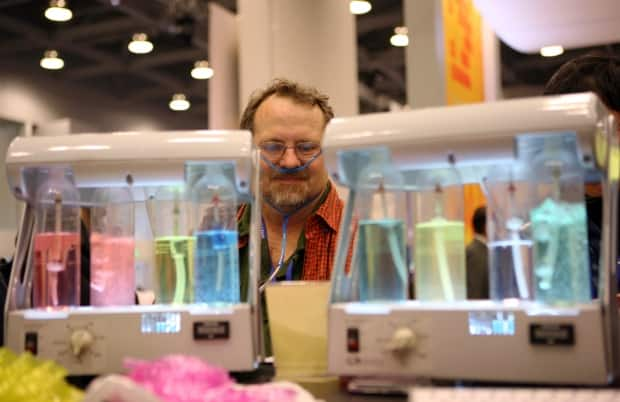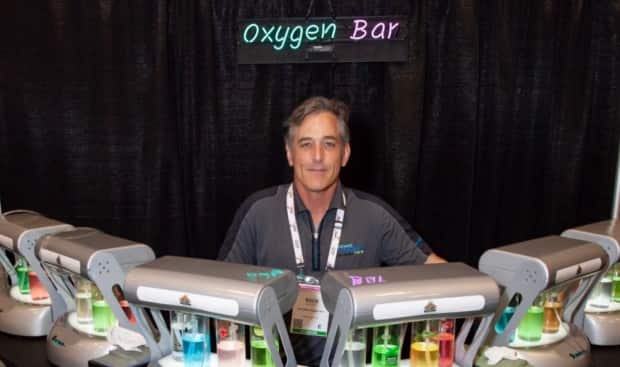Only 1 type of business still isn't allowed to reopen in Ontario — oxygen bars

The oxygen bar is one of the first things Julie Baker sees when she walks into her spa. Since the pandemic began, its chairs have sat empty, lights off, blocked to customers by a homemade closed sign.
"It looks a little sad but that's how it has to remain," said Baker, who runs Gold Tan & Sunset Spa, on the border of Mississauga and Oakville, Ont.
Oxygen bars like Baker's are the "only business that is required to be closed" currently under Ontario's reopening plans, said Bill Campbell with the province's Ministry of Health in an email.
Ontario has let every other type of business open — from communal steam rooms and saunas to buffets. Some still have restrictions like mandatory masking and capacity limits.
Campbell said oxygen bars are "high-risk for COVID-19 transmission" and this can't be "mitigated by putting additional precautions or measures in place."
Typically, customers at an oxygen bar would sit, put a disposable tube up their nose and breathe oxygen for relaxation and health benefits like muscle and hangover recovery, which have been disputed. The Canadian Society of Respiratory Therapists once put out a statement saying it could not "ethically or morally support" giving oxygen therapy for those who don't need it, calling for "stringent regulations."
Baker has questions and she hasn't been able to get answers from her local health unit or the province. She said customers can even wear a face mask while using her oxygen bar.
"They're just stating that it's high risk but they're not giving us a reason why," she said. "None of it really adds up and none of it's really fair ... they don't really understand."

She explains she's now able to give a facial, with the customers' mask being fully removed at points. "But they're not allowed to sit alone by themselves and intake oxygen."
CBC contacted all 34 health units in Ontario to see if any had additional closures or restrictions beyond the province's lone holdout on reopening. Almost all replied; none had any closures in place beyond oxygen bars.
No one seemed to have an idea how many oxygen bars there are in Ontario or how many people they employ. The majority of health units weren't aware of any oxygen bars in their region; Toronto Public Health said it doesn't track oxygen bars, the Ministry of Health did not have any information and the Ontario Chamber of Commerce didn't have access to data.
A Google search reveals a handful of oxygen bars in Ontario, operating as part of other businesses like spas and tanning salons. There was even one in a nightclub in London, Ont. Under Ontario's reopening rules, the other part of the business is allowed to be open, just not the oxygen bar.
'High-risk transmission'
The continued closure makes sense to Rebecca Shalansky, a fourth-year public health and preventive medicine resident at the University of Toronto, given COVID-19 is a respiratory virus.
"With a respiratory virus, if you're putting something directly into your respiratory system, that would be a high-risk transmission situation."
As little has been studied about exactly how much COVID transmission oxygen bars could cause, Shalansky thinks the province is probably erring on the side of caution.
She wants to see few COVID cases and a very high vaccination rate before allowing oxygen bars to open again.
CBC reached out to ministries of health of all provinces and territories, hearing back from all but New Brunswick. Only Manitoba mentioned it too is not allowing the use of oxygen bars, falling under the same order as hookahs or other types of water pipes. All three territories reported not having any oxygen bars.
The oxygen bar ban surprises Rick McVicar. He had no idea Ontario is keeping oxygen bars closed for now.
McVicar runs an oxygen bar company in British Columbia and sits on the board of the Recreational Oxygen Association of North America (ROANA).

Business dried up during the pandemic but he kept busy creating a COVID-19 safety guide for oxygen bars, covering cleaning, sanitizing, disinfecting gear and putting up plexiglass barriers.
"If [Ontario] knows something that I don't, I'd love to be able to hear from them to find out what it is … because we need to implement that into our safety plan."
'It's hurt us'
Spencer Smith has put his oxygen bar gear in storage, where it's currently "collecting dust." It's usually part of his business, Immerse Wellness Centre in Kingston, Ont., which offers float and cold water therapy.
Customers could previously combine floating with a visit to the oxygen bar. But that's not allowed right now.
"It's hurt us, I'm not going to lie," he said. "I feel like that's the nice safety net that the government kind of lies in a lot of the time right where it's better to play it over safe than to look for a better tomorrow."
WATCH | How Canadians are responding to the latest reopening phases:
Smith sees an irony in that COVID-19 patients are being put on oxygen in hospitals, yet he's not allowed to let people use his oxygen bar. He knows it's two very different circumstances and his is non-medical, but still.
He has no idea when he may be allowed to reopen the oxygen bar. CBC asked the Ministry of Health for a timeline but it has not yet responded.
"Much like everything in 2020-2021, it hurts in all the weirdest of ways," said Smith.

